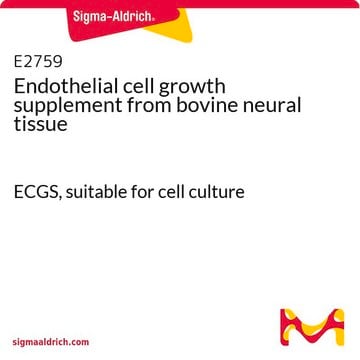DI TNC1
98102214, rat brain, Neuronal (astrocyte)
Se connecterpour consulter vos tarifs contractuels et ceux de votre entreprise/organisme
About This Item
Code UNSPSC :
41106514
Produits recommandés
product name
DI TNC1, 98102214
Source biologique
rat brain
Mode de croissance
Adherent
Caryotype
Not specified
Morphologie
Neuronal (astrocyte)
Produits
Alpha-2 macroglobulin
Récepteurs
Not specified
Technique(s)
cell culture | mammalian: suitable
Conditions d'expédition
dry ice
Température de stockage
−196°C
Origine de la lignée cellulaire
Rat Astrocyte transfected
Description de la lignée cellulaire
Established by transfecting cultures of primary astrocytes from diencephalon tissue of a 1 day old sprague-dawley rat with a DNA construct containing the oncogenic early region of SV40. Transcriptional control was affected using the human GFAP promoter (pGFA-SV-Tt) and the murine phosphoglycerate kinase promoter (pPGK-neo). Cloning was achieved using G418. The cells are phenotypically similar to type 1 astrocytes, including immunoreactivity to glial fibrillary acid protein (GFAP) and a β-alanine inhibitable high-affinity uptake mechanism for gamma amino butyric acid (GABA). α-2-macroglobulin production is similar to that found in primary astrocytes, but transferrin production is reduced. The cell line has been shown not to produce proenkephalin A, galactocerebroside or to express the 04 or A2B5 epitopes characteristic of type 2 astrocytes. Immunostaining has shown the SV40 T antigen to be present in over 90% of cells.
Application
Studies of the development and biochemistry of the central neurosystem
Milieu de culture
DMEM + 4mM Glutamine + 1mM Sodium Pyruvate (NaP) + 10% Foetal Bovine Serum (FBS).
Procédure de repiquage
Split sub-confluent cultures (70-80%) at 1:2 to 1:6 using 0.25% trypsin or trypsin/EDTA; 5% CO2; 37°C. Subculture before flasks become confluent or cells will detach in sheets reducing effectiveness of trypsin.
Autres remarques
Additional freight & handling charges may be applicable for Asia-Pacific shipments. Please check with your local Customer Service representative for more information.
Certificats d'analyse (COA)
Recherchez un Certificats d'analyse (COA) en saisissant le numéro de lot du produit. Les numéros de lot figurent sur l'étiquette du produit après les mots "Lot" ou "Batch".
Déjà en possession de ce produit ?
Retrouvez la documentation relative aux produits que vous avez récemment achetés dans la Bibliothèque de documents.
Notre équipe de scientifiques dispose d'une expérience dans tous les secteurs de la recherche, notamment en sciences de la vie, science des matériaux, synthèse chimique, chromatographie, analyse et dans de nombreux autres domaines..
Contacter notre Service technique





